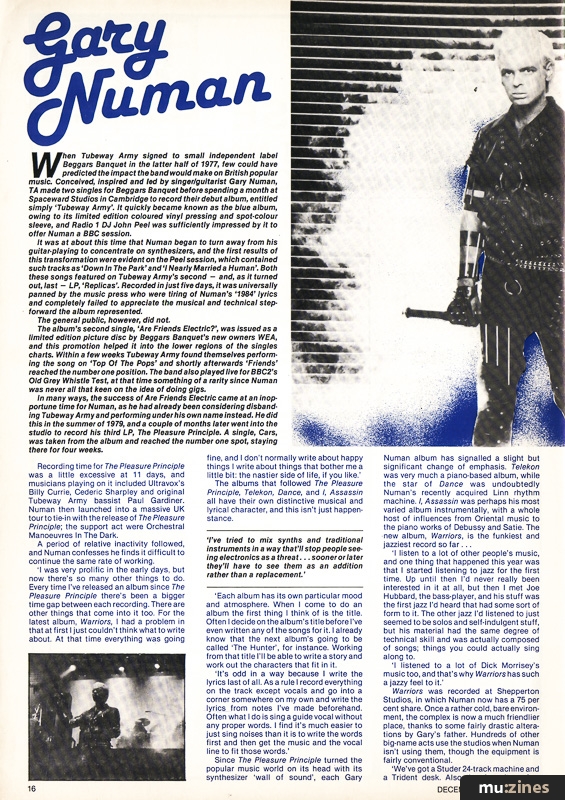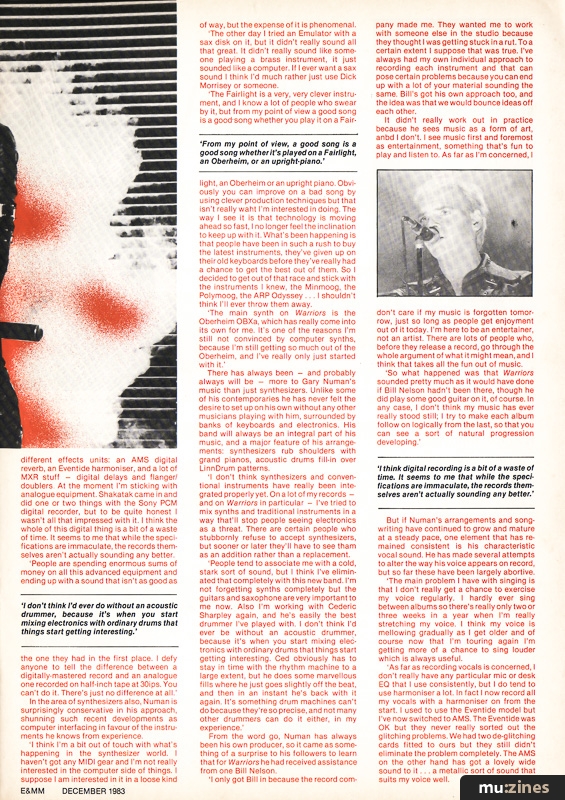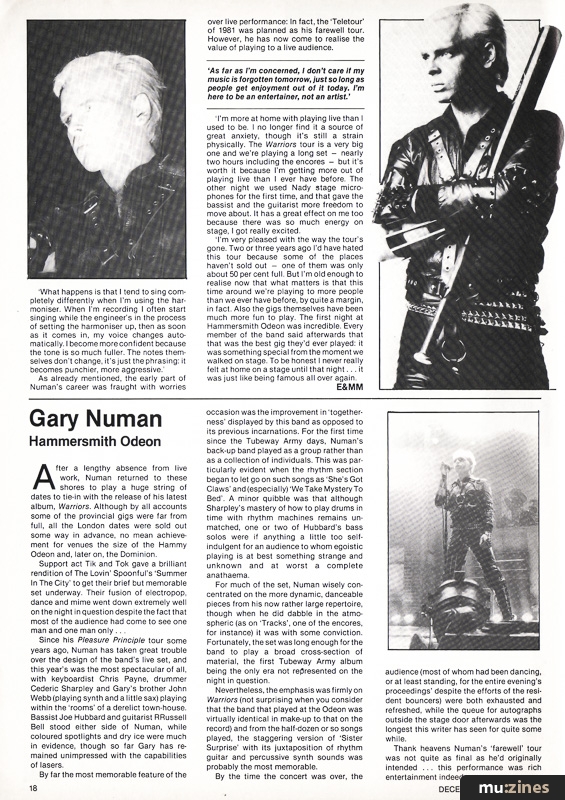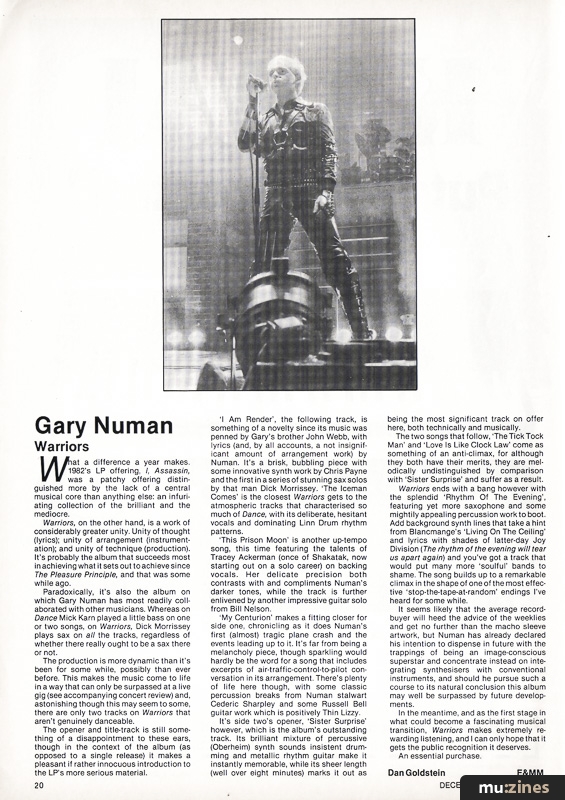Magazine Archive
Home -> Magazines -> Issues -> Articles in this issue -> View
Gary Numan | |
Gary NumanArticle from Electronics & Music Maker, December 1983 | |
One of the most successful, certainly the most consistent, of Britain's electronic musicians, Gary Numan has succeeded in taking his eclectic and compelling music into the mass market. Gary talks of his songwriting and recording techniques, his past career, and what he plans for the future

When Tubeway Army signed to small independent label Beggars Banquet in the latter half of 1977, few could have predicted the impact the band would make on British popular music. Conceived, inspired and led by singer/guitarist Gary Numan, TA made two singles for Beggars Banquet before spending a month at Spaceward Studios in Cambridge to record their debut album, entitled simply 'Tubeway Army'. It quickly became known as the blue album, owing to its limited edition coloured vinyl pressing and spot-colour sleeve, and Radio 1 DJ John Peel was sufficiently impressed by it to offer Numan a BBC session.
It was at about this time that Numan began to turn away from his guitar-playing to concentrate on synthesizers, and the first results of this transformation were evident on the Peel session, which contained such tracks as 'Down In The Park' and 'I Nearly Married a Human'. Both these songs featured on Tubeway Army's second - and, as it turned out, last - LP, 'Replicas'. Recorded in just five days, it was universally panned by the music press who were tiring of Numan's '1984' lyrics and completely failed to appreciate the musical and technical step-forward the album represented.
The general public, however, did not.
The album's second single, 'Are Friends Electric?', was issued as a limited edition picture disc by Beggars Banquet's new owners WEA, and this promotion helped it into the lower regions of the singles charts. Within a few weeks Tubeway Army found themselves performing the song on 'Top Of The Pops' and shortly afterwards 'Friends' reached the number one position. The band also played live for BBC2's Old Grey Whistle Test, at that time something of a rarity since Numan was never all that keen on the idea of doing gigs.
In many ways, the success of Are Friends Electric came at an inopportune time for Numan, as he had already been considering disbanding Tubeway Army and performing under his own name instead. He did this in the summer of 1979, and a couple of months later went into the studio to record his third LP, The Pleasure Principle. A single, Cars, was taken from the album and reached the number one spot, staying there for four weeks.
Recording time for The Pleasure Principle was a little excessive at 11 days, and musicians playing on it included Ultravox's Billy Currie, Cederic Sharpley and original Tubeway Army bassist Paul Gardiner. Numan then launched into a massive UK tour to tie-in with the release of The Pleasure Principle; the support act were Orchestral Manoeuvres In The Dark.
A period of relative inactivity followed, and Numan confesses he finds it difficult to continue the same rate of working.
'I was very prolific in the early days, but now there's so many other things to do. Every time I've released an album since The Pleasure Principle there's been a bigger time gap between each recording. There are other things that come into it too. For the latest album, Warriors, I had a problem in that at first I just couldn't think what to write about. At that time everything was going fine, and I don't normally write about happy things I write about things that bother me a little bit: the nastier side of life, if you like.'
The albums that followed The Pleasure Principle, Telekon, Dance, and I, Assassin all have their own distinctive musical and lyrical character, and this isn't just happenstance.
'Each album has its own particular mood and atmosphere. When I come to do an album the first thing I think of is the title. Often I decide on the album's title before I've even written any of the songs for it. I already know that the next album's going to be called 'The Hunter', for instance. Working from that title I'll be able to write a story and work out the characters that fit in it.
'It's odd in a way because I write the lyrics last of all. As a rule I record everything on the track except vocals and go into a corner somewhere on my own and write the lyrics from notes I've made beforehand. Often what I do is sing a guide vocal without any proper words. I find it's much easier to just sing noises than it is to write the words first and then get the music and the vocal line to fit those words.'

Since The Pleasure Principle turned the popular music world on its head with its synthesizer 'wall of sound', each Gary Numan album has signalled a slight but significant change of emphasis. Telekon was very much a piano-based album, while the star of Dance was undoubtedly Numan's recently acquired Linn rhythm machine. I, Assassin was perhaps his most varied album instrumentally, with a whole host of influences from Oriental music to the piano works of Debussy and Satie. The new album, Warriors, is the funkiest and jazziest record so far...
"I've tried to mix synths and traditional instruments in away that'll stop people seeing electronics as a threat... sooner or later they'll have to see them as an addition rather than a replacement."
'I listen to a lot of other people's music, and one thing that happened this year was that I started listening to jazz for the first time. Up until then I'd never really been interested in it at all, but then I met Joe Hubbard, the bass-player, and his stuff was the first jazz I'd heard that had some sort of form to it. The other jazz I'd listened to just seemed to be solos and self-indulgent stuff, but his material had the same degree of technical skill and was actually composed of songs; things you could actually sing along to.
'I listened to a lot of Dick Morrisey's music too, and that's why Warriors has such a jazzy feel to it.'
Warriors was recorded at Shepperton Studios, in which Numan now has a 75 per cent share. Once a rather cold, bare environment, the complex is now a much friendlier place, thanks to some fairly drastic alterations by Gary's father. Hundreds of other big-name acts use the studios when Numan isn't using them, though the equipment is fairly conventional.
'We've got a Studer 24-track machine and a Trident desk. Also there's quite a few different effects units: an AMS digital reverb, an Eventide harmoniser, and a lot of MXR stuff - digital delays and flanger/doublers. At the moment I'm sticking with analogue equipment. Shakatak came in and did one or two things with the Sony PCM digital recorder, but to be quite honest I wasn't all that impressed with it. I think the whole of this digital thing is a bit of a waste of time. It seems to me that while the specifications are immaculate, the records themselves aren't actually sounding any better.
'People are spending enormous sums of money on all this advanced equipment and ending up with a sound that isn't as good as the one they had in the first place. I defy anyone to tell the difference between a digitally-mastered record and an analogue one recorded on half-inch tape at 30ips. You can't do it. There's just no difference at all.'
In the area of synthesizers also, Numan is surprisingly conservative in his approach, shunning such recent developments as computer interfacing in favour of the instruments he knows from experience.
'I think I'm a bit out of touch with what's happening in the synthesizer world. I haven't got any MIDI gear and I'm not really interested in the computer side of things. I suppose I am interested in it in a loose kind of way, but the expense of it is phenomenal.
'The other day I tried an Emulator with a sax disk on it, but it didn't really sound all that great. It didn't really sound like someone playing a brass instrument, it just sounded like a computer. If I ever want a sax sound I think I'd much rather just use Dick Morrisey or someone.

'The Fairlight is a very, very clever instrument, and I know a lot of people who swear by it, but from my point of view a good song is a good song whether you play it on a Fairlight, an Oberheim or an upright piano. Obviously you can improve on a bad song by using clever production techniques but that isn't really what I'm interested in doing. The way I see it is that technology is moving ahead so fast, I no longer feel the inclination to keep up with it. What's been happening is that people have been in such a rush to buy the latest instruments, they've given up on their old keyboards before they've really had a chance to get the best out of them. So I decided to get out of that race and stick with the instruments I knew, the Minimoog, the Polymoog, the ARP Odyssey... I shouldn't think I'll ever throw them away.
"I don't think I'd ever do without an acoustic drummer, because it's when you start mixing electronics with ordinary drums that things start getting interesting."
'The main synth on Warriors is the Oberheim OBXa, which has really come into its own for me. It's one of the reasons I'm still not convinced by computer synths, because I'm still getting so much out of the Oberheim, and I've really only just started with it.'
There has always been - and probably always will be - more to Gary Numan's music than just synthesizers. Unlike some of his contemporaries he has never felt the desire to set up on his own without any other musicians playing with him, surrounded by banks of keyboards and electronics. His band will always be an integral part of his music, and a major feature of his arrangements: synthesizers rub shoulders with grand pianos, acoustic drums fill-in over LinnDrum patterns.
'I don't think synthesizers and conventional instruments have really been integrated properly yet. On a lot of my records - and on Warriors in particular - I've tried to mix synths and traditional instruments in a way that'll stop people seeing electronics as a threat. There are certain people who stubbornly refuse to accept synthesizers, but sooner or later they'll have to see them as an addition rather than a replacement.

'People tend to associate me with a cold, stark sort of sound, but I think I've eliminated that completely with this new band. I'm not forgetting synths completely but the guitars and saxophone are very important to me now. Also I'm working with Cederic Sharpley again, and he's easily the best drummer I've played with. I don't think I'd ever be without an acoustic drummer, because it's when you start mixing electronics with ordinary drums that things start getting interesting. Ced obviously has to stay in time with the rhythm machine to a large extent, but he does some marvellous fills where he just goes slightly off the beat, and then in an instant he's back with it again. It's something drum machines can't do because they're so precise, and not many other drummers can do it either, in my experience.'
From the word go, Numan has always been his own producer, so it came as something of a surprise to his followers to learn that for Warriors he had received assistance from one Bill Nelson.
'I only got Bill in because the record company made me. They wanted me to work with someone else in the studio because they thought I was getting stuck in a rut. To a certain extent I suppose that was true. I've always had my own individual approach to recording each instrument and that can pose certain problems because you can end up with a lot of your material sounding the same. Bill's got his own approach too, and the idea was that we would bounce ideas off each other.
It didn't really work out in practice because he sees music as a form of art, and I don't. I see music first and foremost as entertainment, something that's fun to play and listen to. As far as I'm concerned, I don't care if my music is forgotten tomorrow, just so long as people get enjoyment out of it today. I'm here to be an entertainer, not an artist. There are lots of people who, before they release a record, go through the whole argument of what it might mean, and I think that takes all the fun out of music.
'So what happened was that Warriors sounded pretty much as it would have done if Bill Nelson hadn't been there, though he did play some good guitar on it, of course. In any case, I don't think my music has ever really stood still; I try to make each album follow on logically from the last, so that you can see a sort of natural progression developing.'
But if Numan's arrangements and songwriting have continued to grow and mature at a steady pace, one element that has remained consistent is his characteristic vocal sound. He has made several attempts to alter the way his voice appears on record, but so far these have been largely abortive.
"From my point of view, a good song is a good song whether it's played on a Fairlight, an Oberheim, or an upright-piano."
'The main problem I have with singing is that I don't really get a chance to exercise my voice regularly. I hardly ever sing between albums so there's really only two or three weeks in a year when I'm really stretching my voice. I think my voice is mellowing gradually as I get older and of course now that I'm touring again I'm getting more of a chance to sing louder which is always useful.
'As far as recording vocals is concerned, I don't really have any particular mic or desk EQ that I use consistently, but I do tend to use harmoniser a lot. In fact I now record all my vocals with a harmoniser on from the start. I used to use the Eventide model but I've now switched to AMS. The Eventide was OK but they never really sorted out the glitching problems. We had two de-glitching cards fitted to ours but they still didn't eliminate the problem completely. The AMS on the other hand has got a lovely wide sound to it... a metallic sort of sound that suits my voice well.
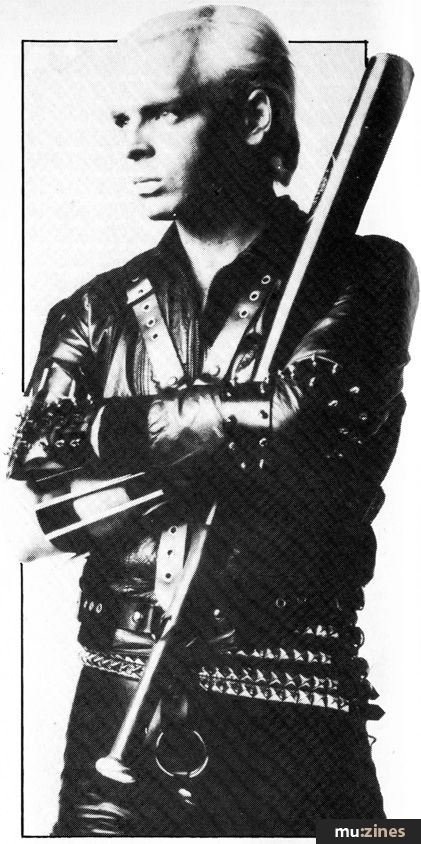
'What happens is that I tend to sing completely differently when I'm using the harmoniser. When I'm recording I often start singing while the engineer's in the process of setting the harmoniser up, then as soon as it comes in, my voice changes automatically. I become more confident because the tone is so much fuller. The notes themselves don't change, it's just the phrasing: it becomes punchier, more aggressive.'
As already mentioned, the early part of Numan's career was fraught with worries over live performance: In fact, the 'Teletour' of 1981 was planned as his farewell tour. However, he has now come to realise the value of playing to a live audience.
'I'm more at home with playing live than I used to be. I no longer find it a source of great anxiety, though it's still a strain physically. The Warriors tour is a very big one and we're playing a long set - nearly two hours including the encores - but it's worth it because I'm getting more out of playing live than I ever have before. The other night we used Nady stage microphones for the first time, and that gave the bassist and the guitarist more freedom to move about. It has a great effect on me too because there was so much energy on stage, I got really excited.
'I'm very pleased with the way the tour's gone. Two or three years ago I'd have hated this tour because some of the places haven't sold out - one of them was only about 50 per cent full. But I'm old enough to realise now that what matters is that this time around we're playing to more people than we ever have before, by quite a margin, in fact. Also the gigs themselves have been much more fun to play. The first night at Hammersmith Odeon was incredible. Every member of the band said afterwards that that was the best gig they'd ever played: it was something special from the moment we walked on stage. To be honest I never really felt at home on a stage until that night... it was just like being famous all over again.
Gary Numan
Hammersmith Odeon

After a lengthy absence from live work, Numan returned to these shores to play a huge string of dates to tie-in with the release of his latest album, Warriors. Although by all accounts some of the provincial gigs were far from full, all the London dates were sold out some way in advance, no mean achievement for venues the size of the Hammy Odeon and, later on, the Dominion.
Support act Tik and Tok gave a brilliant rendition of The Lovin' Spoonful's 'Summer In The City' to get their brief but memorable set underway. Their fusion of electropop, dance and mime went down extremely well on the night in question despite the fact that most of the audience had come to see one man and one man only...
Since his Pleasure Principle tour some years ago, Numan has taken great trouble over the design of the band's live set, and this year's was the most spectacular of all, with keyboardist Chris Payne, drummer Cederic Sharpley and Gary's brother John Webb (playing synth and a little sax) playing within the 'rooms' of a derelict town-house. Bassist Joe Hubbard and guitarist Russell Bell stood either side of Numan, while coloured spotlights and dry ice were much in evidence, though so far Gary has remained unimpressed with the capabilities of lasers.
"I think digital recording is a bit of a waste of time. It seems to me that while the specifications are immaculate, the records themselves aren't actually sounding any better."
By far the most memorable feature of the occasion was the improvement in 'togetherness' displayed by this band as opposed to its previous incarnations. For the first time since the Tubeway Army days, Numan's back-up band played as a group rather than as a collection of individuals. This was particularly evident when the rhythm section began to let go on such songs as 'She's Got Claws' and (especially) 'We Take Mystery To Bed'. A minor quibble was that although Sharpley's mastery of how to play drums in time with rhythm machines remains unmatched, one or two of Hubbard's bass solos were if anything a little too self-indulgent for an audience to whom egoistic playing is at best something strange and unknown and at worst a complete anathema.
For much of the set, Numan wisely concentrated on the more dynamic, danceable pieces from his now rather large repertoire, though when he did dabble in the atmospheric (as on 'Tracks', one of the encores, for instance) it was with some conviction. Fortunately, the set was long enough for the band to play a broad cross-section of material, the first Tubeway Army album being the only era not represented on the night in question.
Nevertheless, the emphasis was firmly on Warriors (not surprising when you consider that the band that played at the Odeon was virtually identical in make-up to that on the record) and from the half-dozen or so songs played, the staggering version of 'Sister Surprise' with its juxtaposition of rhythm guitar and percussive synth sounds was probably the most memorable.
By the time the concert was over, the audience (most of whom had been dancing, or at least standing, for the entire evening's proceedings' despite the efforts of the resident bouncers) were both exhausted and refreshed, while the queue for autographs outside the stage door afterwards was the longest this writer has seen for quite some while.
Thank heavens Numan's 'farewell' tour was not quite as final as he'd originally intended ... this performance was rich entertainment indeed.
Gary Numan
Warriors
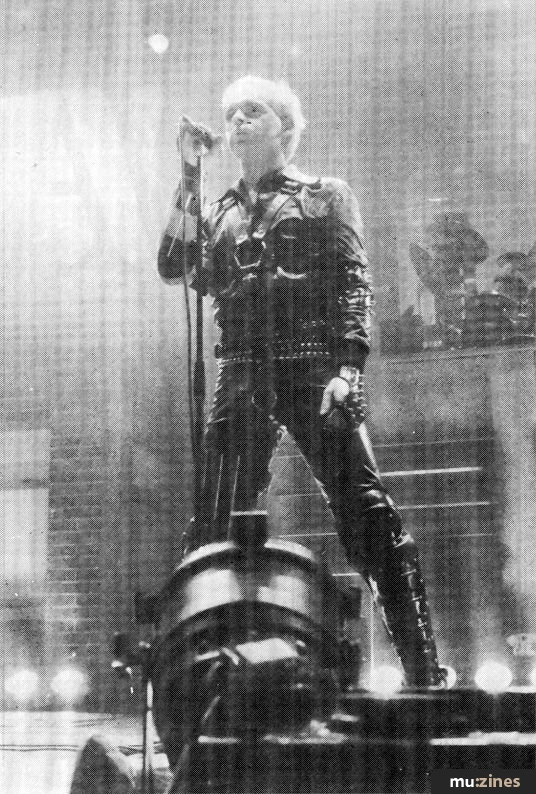
What a difference a year makes. 1982's LP offering, I, Assassin, was a patchy offering distinguished more by the lack of a central musical core than anything else: an infuriating collection of the brilliant and the mediocre.
Warriors, on the other hand, is a work of considerably greater unity. Unity of thought (lyrics); unity of arrangement (instrumentation); and unity of technique (production). It's probably the album that succeeds most in achieving what it sets out to achieve since The Pleasure Principle, and that was some while ago.
Paradoxically, it's also the album on which Gary Numan has most readily collaborated with other musicians. Whereas on Dance Mick Karn played a little bass on one or two songs, on Warriors, Dick Morrissey plays sax on all the tracks, regardless of whether there really ought to be a sax there or not.
The production is more dynamic than it's been for some while, possibly than ever before. This makes the music come to life in a way that can only be surpassed at a live gig (see accompanying concert review) and, astonishing though this may seem to some, there are only two tracks on Warriors that aren't genuinely danceable.
"As far as I'm concerned, I don't care if my music is forgotten tomorrow, just so long as people get enjoyment out of it today. I'm here to be an entertainer, not an artist."
The opener and title-track is still something of a disappointment to these ears, though in the context of the album (as opposed to a single release) it makes a pleasant if rather innocuous introduction to the LP's more serious material.
'I Am Render', the following track, is something of a novelty since its music was penned by Gary's brother John Webb, with lyrics (and, by all accounts, a not insignificant amount of arrangement work) by Numan. It's a brisk, bubbling piece with some innovative synth work by Chris Payne and the first in a series of stunning sax solos by that man Dick Morrissey. 'The Iceman Comes' is the closest Warriors gets to the atmospheric tracks that characterised so much of Dance, with its deliberate, hesitant vocals and dominating Linn Drum rhythm patterns.
'This Prison Moon' is another up-tempo song, this time featuring the talents of Tracey Ackerman (once of Shakatak, now starting out on a solo career) on backing vocals. Her delicate precision both contrasts with and compliments Numan's darker tones, while the track is further enlivened by another impressive guitar solo from Bill Nelson.
'My Centurion' makes a fitting closer for side one, chronicling as it does Numan's first (almost) tragic plane crash and the events leading up to it. It's far from being a melancholy piece, though sparkling would hardly be the word for a song that includes excerpts of air-traffic-control-to-pilot conversation in its arrangement. There's plenty of life here though, with some classic percussion breaks from Numan stalwart Cederic Sharpley and some Russell Bell guitar work which is positively Thin Lizzy.
It's side two's opener, 'Sister Surprise' however, which is the album's outstanding track. Its brilliant mixture of percussive (Oberheim) synth sounds insistent drumming and metallic rhythm guitar make it instantly memorable, while its sheer length (well over eight minutes) marks it out as being the most significant track on offer here, both technically and musically.
The two songs that follow, 'The Tick Tock Man' and 'Love Is Like Clock Law' come as something of an anti-climax, for although they both have their merits, they are melodically undistinguished by comparison with 'Sister Surprise' and suffer as a result.
Warriors ends with a bang however with the splendid 'Rhythm Of The Evening', featuring yet more saxophone and some mightily appealing percussion work to boot. Add background synth lines that take a hint from Blancmange's 'Living On The Ceiling' and lyrics with shades of latter-day Joy Division (The rhythm of the evening will tear us apart again) and you've got a track that would put many more 'soulful' bands to shame. The song builds up to a remarkable climax in the shape of one of the most effective 'stop-the-tape-at-random' endings I've heard for some while.
It seems likely that the average record-buyer will heed the advice of the weeklies and get no further than the macho sleeve artwork, but Numan has already declared his intention to dispense in future with the trappings of being an image-conscious superstar and concentrate instead on integrating synthesisers with conventional instruments, and should he pursue such a course to its natural conclusion this album may well be surpassed by future developments.
In the meantime, and as the first stage in what could become a fascinating musical transition, Warriors makes extremely rewarding listening, and I can only hopethat it gets the public recognition it deserves.
An essential purchase.
More with this artist
The Odd Couple (Gary Numan) |
The Air and the Fury (Gary Numan) |
Just Can't Stop (Gary Numan) |
Bright New Things - Sharpe & Numan (Gary Numan) |
More from related artists
The Managers (Tony Webb) |
Publisher: Electronics & Music Maker - Music Maker Publications (UK), Future Publishing.
The current copyright owner/s of this content may differ from the originally published copyright notice.
More details on copyright ownership...
Interview by Dan Goldstein
Help Support The Things You Love
mu:zines is the result of thousands of hours of effort, and will require many thousands more going forward to reach our goals of getting all this content online.
If you value this resource, you can support this project - it really helps!
Donations for November 2025
Issues donated this month: 0
New issues that have been donated or scanned for us this month.
Funds donated this month: £0.00
All donations and support are gratefully appreciated - thank you.
Magazines Needed - Can You Help?
Do you have any of these magazine issues?
If so, and you can donate, lend or scan them to help complete our archive, please get in touch via the Contribute page - thanks!




